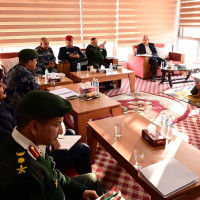- Sunday, 22 February 2026
Far-western Women’s Health In Peril
Far-western province has a sex ratio of 89.51 males per 100 females (Census, 2021), more than the national average. Despite the higher ratio, women have limited access to education, healthcare and economic opportunities in the region. As women reel from miserable health conditions, the lack of specialised doctors in the vicinity, household work restricting them from further hospital visits, and cattle keeping them in informal house arrests add to their woes. The provision of specialised doctors is limited only in district hospitals, where primary health centres are equipped with medical officers and ward health posts are guarded by auxiliary health workers.
Most of the women in the region have not yet consulted any gynecologists and/or obstetricians. After analysing the situation, Nepalmed e.V., a German organisation that initiates medical assistance in Nepal, decided to run a three-day camp in three wards of Patan Municipality in Baitadi District. The women volunteers were deployed from their respective wards to circulate information about the dedicated gynecology and obstetrics camp.
Reproductive illnesses
The vulnerability of the health condition came into light with the findings showing that there were more than 50 per cent of women had some kind of inflammatory condition of the reproductive system, commonly known as Pelvic Inflammatory Disease (PID). The cases of Abnormal Uterine Bleeding (AUB) and Urinary Tract Infection (UTI) were also among the top cases. Other gynecological conditions, such as Uterovaginal Prolapse (UVP), subfertility, and amenorrhea, were also diagnosed. Despite being a dedicated gynecological camp, some non-gynecological complaints, including Acid Peptic Disease (APD), musculoskeletal pain, and headache, were spotted.
With two specialised doctors brought from Kathmandu and locally recruited medical team, PID was mostly treated with antibacterial drugs given orally and in some severe cases, it was sent through vaginal route. AUB was managed by treating the underlying pathology, be it surgically excising an abnormal growth or hormone therapy, or other specific modalities. Antibacterial drugs and urinary antiseptics were used in cases of UTI. UVP was managed among 18 patients by inserting a ring pessary, which has to be replaced every 3 months.
Patients were given consultation for APD, where they were suggested to take frequent light meals at regular intervals, to avoid fatty and spicy foods, and to consume drugs that inhibit gastric acid secretion or that reduce the acidity of gastric contents. Most of them were suggested to take care of genital hygiene, and drinking plenty of water can prevent UTIs and also aid in their management. Sexuality education remains a taboo topic in the country, where the rural setting is taking the brunt of it. Upon performing ultrasonography of the abdomen and pelvis for 128 cases, the major findings included signs of pelvic inflammatory disease, followed by ovarian cysts, increased endometrial thickness, and urinary stones.
The case of PID, the most prevalent clinical condition observed in the camps, owes its causation to unsafe practices regarding sexual intercourse, childbirth, and abortion. Failure to maintain aseptic conditions during delivery of a baby, performing unsafe abortion leading to infection, and engaging in unprotected sexual acts with multiple sexual partners were the major factors. The need for comprehensive sexuality education is crucial, especially in rural settings, so that these problems can be mitigated.
These cases can be lessened with awareness programmes, where they should be made aware of the good consequences of adopting safe sexual practices like indulging in protected sexual intercourse and avoiding multiple sexual partners. Making necessary visits to medical institutions for childbirth and abortion to ensure aseptic conditions can greatly reduce the chances of infection of the female reproductive system.
Menstrual health and hygiene are often neglected in rural settings due to social norms, taboos, and stigmas associated with it. Inadequate infrastructure linked with limited water resources, confined/ restricted places, and unavailability of proper sanitation in the vicinity prove bottlenecks in menstrual health and hygiene. The consequences have led to UTI cases in most women with poor hygiene. Due to the multiple roles in domestic, agricultural, and off-farm work, which were not complemented by a good diet, the older female population was diagnosed with UVP, where prolapse of the pelvic organs takes place due to weakening of the pelvic floor muscles.
Immediate action
Women who were diagnosed with APD, or gastric discomfort, were due to their irregular eating practices, such as taking few but heavy meals, skipping meals, drinking milk tea on an empty stomach, consuming fatty and spicy food, etc. The camp not only saw general cases, but also came across some complicated cases that could not be performed at the camp due to the unavailability of resources. Cases like dermoid cyst of the ovary, which require surgical procedure, a handful of suspicious cases suggestive of potential malignancy were effectively screened and were referred to higher centres for further evaluation. Patients complaining of subfertility were adequately counselled and referred to fertility clinics.
Far-western women are struggling with fragile health conditions, where the government needs to take some serious and immediate action. The supply of specialized doctors in health centres and posts should be maintained regularly. The government-funded camps should arrive frequently on a need basis, by giving due priority to women, whose health statuses are degrading drastically. A demand for remote medical services has emerged in cases where specialized doctors are unavailable. Telemedicine, a concept bearing great fruits with the surge in technological devices, can offer remote health care when healthcare professionals and the patient are not physically present with each other.
(The author is a development consultant)















